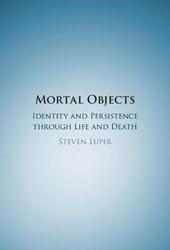
|
Mortal Objects: Identity and Persistence through Life and Death
Hardback
Main Details
| Title |
Mortal Objects: Identity and Persistence through Life and Death
|
| Authors and Contributors |
By (author) Steven Luper
|
| Physical Properties |
| Format:Hardback | | Pages:230 | | Dimensions(mm): Height 235,Width 152 |
|
| Category/Genre | Philosophy
Philosophy - metaphysics and ontology
Ethics and moral philosophy |
|---|
| ISBN/Barcode |
9781108833721
|
| Classifications | Dewey:128.4 |
|---|
| Audience | | Tertiary Education (US: College) | |
|---|
| Illustrations |
Worked examples or Exercises
|
|
Publishing Details |
| Publisher |
Cambridge University Press
|
| Imprint |
Cambridge University Press
|
| Publication Date |
17 February 2022 |
| Publication Country |
United Kingdom
|
Description
How might we change ourselves without ending our existence? What could we become, if we had access to an advanced form of bioengineering that allowed us dramatically to alter our genome? Could we remain in existence after ceasing to be alive? What is it to be human? Might we still exist after changing ourselves into something that is not human? What is the significance of human extinction? Steven Luper addresses these questions and more in this thought-provoking study. He defends an animalist account, which says that we are organisms, but claims that we are also material objects. His book goes to the heart of the most complex questions about what we are and what we might become. Using case studies from the life sciences as well as thought experiments, Luper develops a new way of thinking about the nature of life and death, and whether and how human extinction matters.
Author Biography
Steven Luper is Professor of Philosophy at Trinity University, Texas. He is the author of Invulnerability: On Securing Happiness (1996) and The Philosophy of Death (Cambridge, 2009), and editor of The Cambridge Companion to Life and Death (Cambridge, 2014).
Reviews'Luper's writing is admirably engaging and unpretentious. He doesn't shrink from tackling the hardest problems about the metaphysics of ourselves and other material things. There's no other book like it.' Eric Olson, University of Sheffield
|